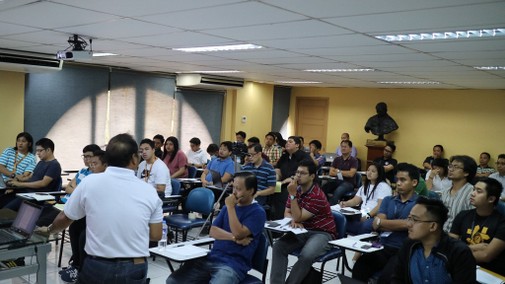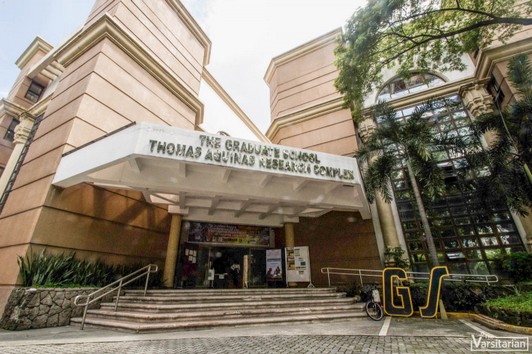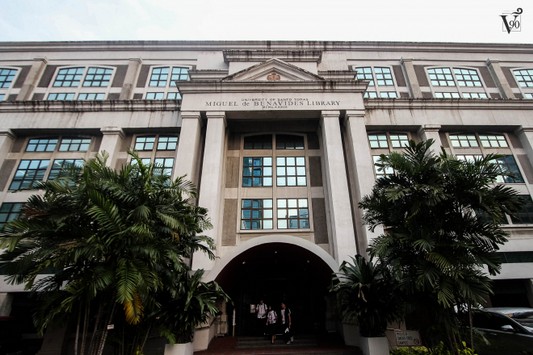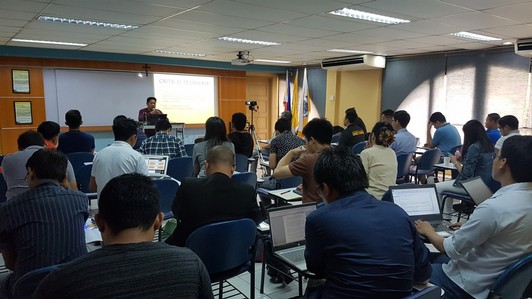Doctor of Philosophy, major in Philosophy
Philosophy Cluster, UST Graduate School
Why a Ph.D. in Philosophy at UST?
As a discipline that seeks the truth and is a guide for life, the program aims to analyze the different aspects of reality, to see their intentions, and to combine them into a systematic whole. The study of Philosophy involves not only the objects under investigation, but also the subject who investigates not only the thought, but also the thinker. More importantly, the study teaches the students to think analytically and critically to enable them to provide deeper insights into the nature of being human, of things, and of values to live by.
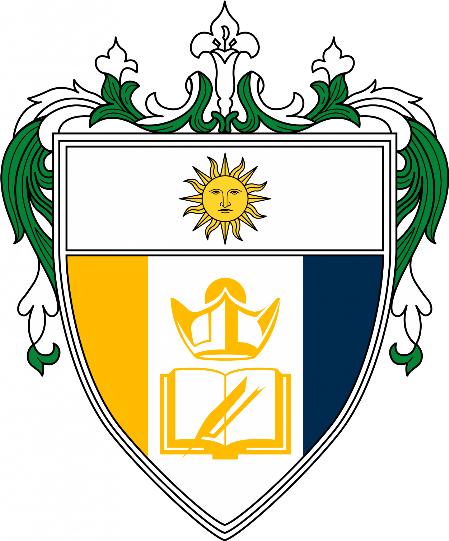
Based on the objectives of the UST Graduate School and the UST Department of Philosophy, the following are the Program Intended Learning Outcomes of the Ph.D. major in Philosophy Program:
- Contribute to the field of philosophy an original research of high standard—first, through the submission of a dissertation of around 80,000 to 100,000 words, then, through individual research and publication. The Ph.D. graduate should be able to represent his/her chosen field of research specialization, gleaned from the research strengths of the Department of Philosophy: Filipino Philosophy, Oriental Thought and East-West Comparative Philosophy, Aristotelian-Thomistic Philosophy and Scholasticism, Continental Philosophy, and Anglo-American Philosophy.
- Continue the UST Department of Philosophy’s tradition of academic excellence and ethical consciousness through intellectual exchange with professional peers, publication of individual research, and teaching.
- Identify the complex philosophical issues and debates involved in the research areas outlined above. The Ph.D. graduate should be able to articulate, critique, expand, and synthesize these issues and debates in teaching, professional academic exchanges, and publication.
- Evaluate and challenge the ethical import of the abovementioned philosophical issues and debates within the spheres of personal and inter-personal life, profession, religion, education, politics, and society.
- Demonstrate proficiency in gathering resources for teaching and research purposes, but, more importantly, should be able to contribute original material to the field through the publication of high quality textbooks, monographs, and scholarly articles.
- Recognize intellectual and cultural diversity through exposure to various philosophical ideas gleaned from both local and international sources.
- Engage philosophically in social, political, and religious issues in a global context.
- Pursue the culture of philosophical research through the exploration of emerging trends in philosophy and the dissemination of these through teaching and publication.
Doctor of Philosophy in Philosophy Program Structure
TOTAL UNITS: 57
A. Prerequisites (9 units)
3 units: Philosophy of St. Thomas Aquinas3 units: Philosophy of the Human Person3 units: Philosophy of Values
B. Specialization (at least 21 units: Any 7 specialization courses)
C. Guided Philosophical Research (GPR-PhD) (9 units)
D. Cognates (6 units)
Any two allied course related to the thesis topic of the student; to be determined at the very beginning, based on the submitted initial research proposal
E. Foreign Language Requirement (6 units, non-credit)
Foreign Language Requirement (any foreign language that has a bearing on the dissertation proposal; may be cross-enrolled in other institutions)
F. Terminal Requirements (12 units)
Written Comprehensive Examinations (WCE)6 units: Dissertation Writing 1 (Proposal Writing and Defense)3 units: Dissertation Writing 2 and 3 (Colloquium and Publication)3 units: Dissertation Writing 4 (Oral Defense)
The Ph.D. major in Philosophy program is unique in the entire country because it is the only graduate philosophy program that incorporates Guided Philosophical Research courses (GPR-PhD 1, GPR-PhD 2, GPR-PhD 3) as a requirement.
Guided Philosophical Research (GPR-PhD 1, 2, and 3) (9 units)
Prerequisites: 18 units of Specialization Courses and a thesis adviser formally assigned by the Philosophy Program Lead.
Stage 1: GPR- PhD 1 – Work-in-Progress Seminar Attendance and Presentation (3 units)
Requirements:
- Compulsory attendance Work-
in- Progress Seminar sessions sponsored by the Department of Philosophy. - Submission of three "thought-
pieces” (maximum of 1000 words each) based on at least three sessions attended to be assessed by the thesis adviser and certified by the Program Lead. - Presentation of the tentative dissertation proposal in at least one of the Work-
in- Progress seminars. The paper should be duly approved by both the thesis adviser and Program Lead. Assessment is based on a certificate of presentation signed by the Chair of the Department of Philosophy and submission of the full paper presented. - Terminal submission: GPR Form 1, Form 2, paper presented, and 3 marked thought-pieces.
Stage 2: GPR-PhD 2 – Conference paper presentation (3 units)
Requirements:
- Presentation of a paper in a public philosophical forum outside the university, either locally or internationally. The paper should be duly approved by both the dissertation adviser and Program Lead.
- Terminal submission: GPR Form 3, certificate of acceptance/invitation from event organizer, full paper presented.
Stage 3: GPR-PhD 3 – Publication (3 units)
Requirements:
- Publication in either a local or international journal of philosophy or journal of the humanities.
- Terminal submission: GPR Form 3, certificate of acceptance from journal editor, letter of endorsement from dissertation adviser, and copy of full paper (N.B. The same publication may be submitted as partial fulfillment for Dissertation Writing II-III).
NB: Application for research fellowships abroad is strongly encouraged. In the event that the Ph.D. student has successfully secured a research fellowship in a foreign institution, the fellowship could be credited in lieu of GPR-PhD 1 and GPR-PhD 2 (a total of 6 units). A full report of the research experience of the Ph.D. student should be submitted to the Program Lead upon completion of the fellowship.
Professorial Roster

Jove Jim S. Aguas
Karol Wojtyla, Martin Buber, Phenomenology, Existentialism
jsaguas@ust.edu.ph
 Fleurdeliz Altez-Albela
Fleurdeliz Altez-AlbelaEmmanuel Levinas, Phenomenology, Existentialism
faalbela@ust.edu.ph
 Jovito V. Cariño
Jovito V. CariñoThomas Aquinas, Alasdair MacIntyre, Social and Political Philosophy
jvcarino@ust.edu.ph
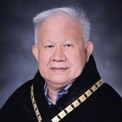
Alfredo P. Co
Chinese Philosophy, Indian Philosophy, East-West Comparative Philosophy
apco@ust.edu.ph
 El Mithra M. Dela Cruz
El Mithra M. Dela CruzIndian Philosophy, Sri Aurobindo, Existetialism
emdelacruz@ust.edu.ph
 Emmanuel C. De Leon
Emmanuel C. De LeonFilipino Philosophy, Martin Heidegger, Philosophy of Pluralism
ecdeleon@ust.edu.ph
 Peter Paul E. Elicor
Peter Paul E. Elicor Philosophy of Childhood, Philosophy for/with Children, Epistemology, Feminist Philosophy and Indigenous Philosophy, and include topics such as epistemic injustice, culture, positionality, and indigenous issues
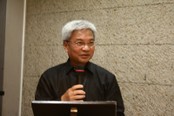
Leovino Ma. Garcia
Paul Ricoeur, Emmanuel Levinas, Phenomenology
 Rhochie Avelino E. Matienzo
Rhochie Avelino E. MatienzoSøren Kierkegaard, Existentialism, Philosophy of Religion
rematienzo@ust.edu.ph
 Robert A. Montaña
Robert A. MontañaThomistic Philosophy, Ethics and Human Rights, Logic and Critical Thinking, Alan Gewirth
ramontana@ust.edu.ph

Ian Raymond B. Pacquing
Erich Fromm, Social and Political Philosophy
ibpacquing@ust.edu.ph
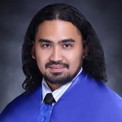 Roland Theuas D. Pada
Roland Theuas D. PadaJacques Derrida, Martin Heidegger, Axel Honneth, Critical Theory
rdpada@ust.edu.ph
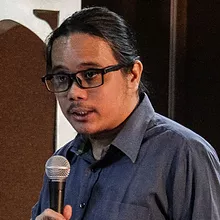 Paolo A. Bolaños
Paolo A. BolañosFriedrich Nietzsche, Theodor Adorno, Critical Theory, Social and Political Philosophy
pabolanos@ust.edu.ph
 Franz Giuseppe F. Cortez
Franz Giuseppe F. CortezPaulo Freire, Critical Business Ethics, Social and Political Philosophy
ffcortez@ust.edu.ph
 Darlene O. Demandante
Darlene O. DemandanteJacques Lacan, Jacques Ranciere, Psychoanalysis
dodemandante@ust.edu.ph
 Marella Ada Mancenido-Bolaños
Marella Ada Mancenido-BolañosPhilosophy for Children, Philosophy of Childhood, and Feminism
mmbolanos@ust.edu.ph
 Jeffry V. Ocay
Jeffry V. OcayCritical Theory (Marcuse and Honneth), Applied Ethics (Social Ethics and Bioethics), Indigenous Rights and Politics of Recognition in South East Asia

Raniel SM. Reyes
Friedrich Nietzsche, Gilles Deleuze & Félix Guattari, Franco Berardi, Byung-Chul Han, Social and Political Philosophy
rsreyes@ust.edu.ph
 Michael Anthony C. Vasco
Michael Anthony C. VascoIndian Philosophy, John Rawls, Phenomenology, Social and Political Philosophy
mcvasco@ust.edu.ph
We look forward to welcoming you to the Department of Philosophy!
Welcome to the UST Graduate School
G/F Thomas Aquinas Research Complex
University of Santo Tomas
España, Manila, 1015 Philippines
graduateschool@ust.edu.ph


